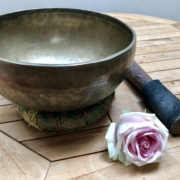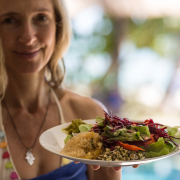 https://samahitaretreat.com/wp-content/uploads/2023/11/IMG_1290-2-scaled.jpg
1920
2560
Kirsten Mia
http://samahitaretreat.com/wp-content/uploads/2024/01/samahita-logo-v2.svg
Kirsten Mia2023-11-21 21:09:402023-11-21 21:09:40Music makes the world go round!
https://samahitaretreat.com/wp-content/uploads/2023/11/IMG_1290-2-scaled.jpg
1920
2560
Kirsten Mia
http://samahitaretreat.com/wp-content/uploads/2024/01/samahita-logo-v2.svg
Kirsten Mia2023-11-21 21:09:402023-11-21 21:09:40Music makes the world go round!Food, Glorious Food!
From ground to table… it’s all about the microbiome.
They say, “you are what you eat” and this is certainly true, for the most part. Other factors will also play a part in our overall health and wellbeing, some of which we may not have any control over, but most of you reading this, DO have control over what you choose to eat and drink. So, what is your relationship with food? Do you know where it comes from? Did you know that new research shows a link between the soil microbiome and your gut microbiome!? In today’s blog we’ll look at some of the factors affecting our diet, health and wellbeing from the ground up!
According to the 2021 report on: The state of food security and nutrition in the world (By the Food and Agriculture Organization of the United Nations) almost 2.37 billion people don’t have access to enough food. A healthy diet is out of reach for around 3 billion people worldwide. 1.9 billion adults worldwide are overweight or obese. Malnutrition, especially early on in life, can have long lasting effects on health and productivity, and the increasing levels of malnutrition and obesity are clearly influencing the rise in non-communicable diseases. 7 out of the top 10 leading causes of death globally, are non-communicable diseases. When you think about it quite simply, urgent action is needed to transform our food and agricultural systems and all other related industries. Everything is interconnected, food production affects climate, diet, health, quality of life, productivity, employment, policy, economy… a domino effect.
How did we get here?…
How we arrived at this point in our human existence certainly didn’t happen overnight, however, sometimes it can take a lot longer than expected for the effects to show results or outcomes. Let’s take chemical fertilizers for example. German chemist Friz Haber won a Nobel prize in 1918 for the Haber-Bosch process, a method used in industry to synthesize ammonia from nitrogen gas and hydrogen gas. This invention is important for the large-scale synthesis of fertilizers and explosives. Originally used in the World Wars to create explosives and poisonous gas, they were then re-purposed and worked to create fertilizers for growing food. At the time, Haber himself could hardly imagine how transformative his work would be, and the consequences, not what he expected.
Fertilizers have been called one the greatest inventions of the 20th century and have certainly transformed the way we farm. NPK (Nitrogen, phosphorus, potassium) are the common main ingredients in chemical fertilizers. When applied to crops, they boost growth and productivity, however, up to half of the nutrients are not taken up by the plants and find their way into the air and water systems; groundwater, rivers, lakes and eventually the ocean where they have caused devastating effects on ecosystems, and thus biodiversity. So initially, chemical fertilizers were hailed as a “miracle invention”, but little did we know what the long-term effects would be. We know NOW, so what can be done to change direction and reverse some of the damage?
It’s all in the soil…
Soil is the lifeblood of agriculture and the planet; it is fundamental to our survival. Healthy soils are essential for healthy plant growth, food production for human nutrition and ecosystem services such as clean water and air. Healthy soils help to regulate the Earth’s climate and store more carbon than all of the world’s forests combined. Industrial agricultures over reliance on chemical fertilizers, tillage and the GMO commodity monoculture crops such as corn, wheat, soy, oats and rice which require constant applications of Round Up/DDT (a pesticide) have devastated the world’s topsoils and biodiversity. The way forward is regenerative agriculture, the way we were farming before chemical fertilizer and monoculture. It is not a “one size fits all” approach and requires farmers to become better managers and custodians of the land. This means planting a variety of crops, fruits and vegetables, livestock rotational grazing and symbiosis as well as integrated management of water, soil, forests and indigenous vegetation.
Here are just some of the benefits of regenerative agriculture:
- Supporting a diversity of vegetation to moderate temperatures, provide habitat and build resilience to climate change
- Improved soil health – structural, chemical and biological properties
- Applying techniques that could sustainably feed growing global populations
- Producing more nutritious food and livestock, and therefore healthier people
- Retaining more water in the soil for uptake by plants and animals – extending the growing season
- Sequestering greater amounts of carbon from the atmosphere
- Reducing input costs, smoothing out production and profit peaks and troughs
- Improving farmer’s quality of life
- Building stronger communities through sharing of ideas, seeds, produce, livestock
Like many things in life, if we lack understanding, knowledge and direct experience, we become disconnected. Most people living in big cities or urban environments have no idea HOW their food is produced as it comes conveniently prepared, wrapped in plastic and anything that doesn’t look perfect, doesn’t even make it onto the shelves. Real, organic, seasonal and nutritious food is NOT perfect looking, and it would serve all human beings if we could make an effort to learn more about how and where our food is grown, form a deeper understanding of the complexities of nature, and support the smaller farmers who are trying to make a difference! Below are a few documentaries you could watch which I found really interesting and provide a wider lens with which to view our food systems. Improve the health of your gut microbiome by getting outside in nature more. Take off your shoes, touch the earth, get your hands in the soil and try planting a few things, even if you live in a flat, you could grow a few pots of herbs on your windowsill. Every little helps!
Until next week, take care and be well! xxx Kirst
- Kiss the Ground (Netflix)
- Fantastic Fungi (Netflix)
- Down to Earth (Netflix)
- Living Soil (YouTube)
- The seeds of Vandana Shiva (Vimeo/Apple Play)
- Sacred Cow (GooglePlay/Amazon/iTunes)
References:
The Omnivores Dilemma – Michael Pollan
https://www.fao.org/3/cb4474en/cb4474en.pdf
https://soilsforlife.org.au/our_purpose/why-soils-are-so-important/
More from the Samahita Blog







